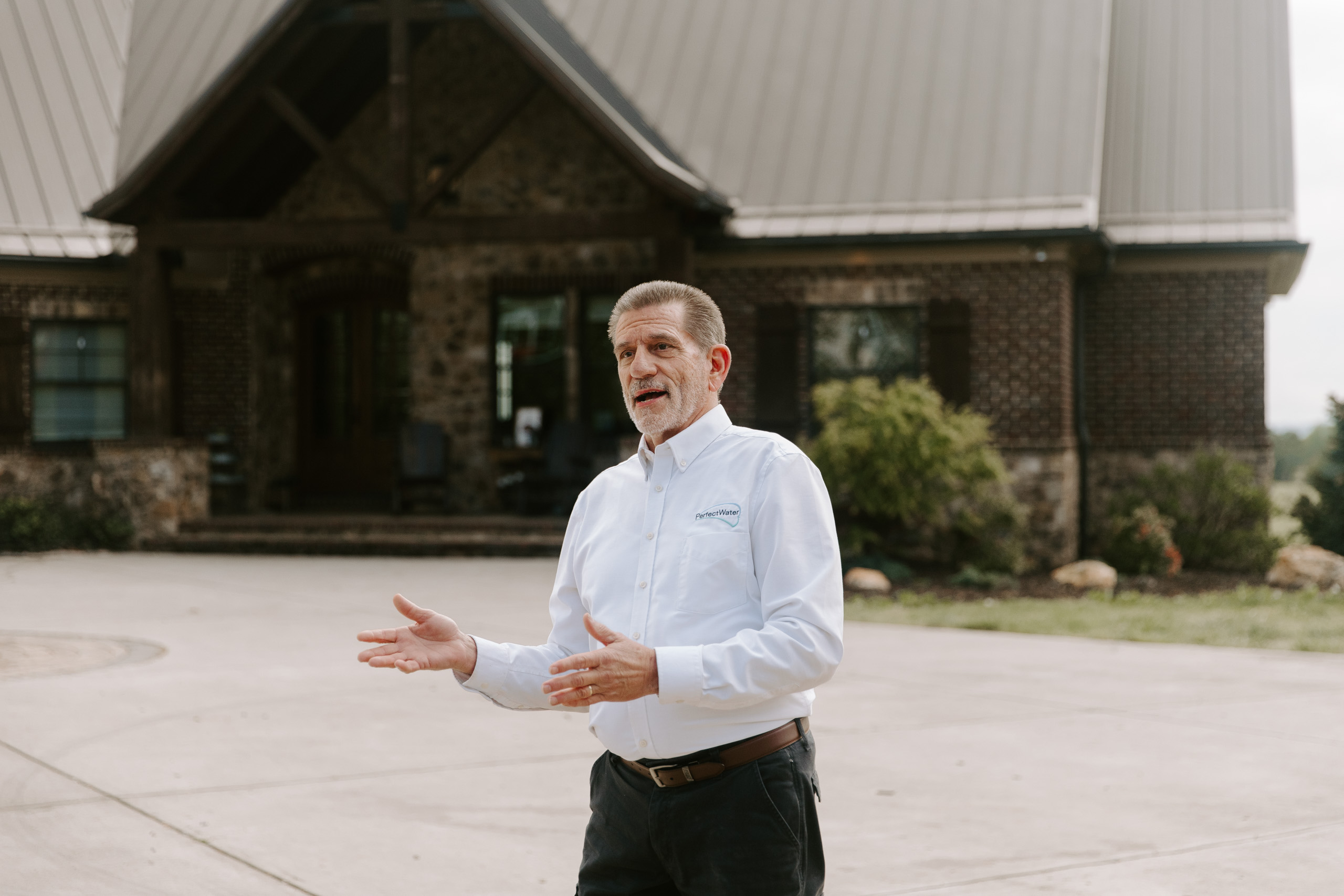Where To Purchase a Water System

There are a lot of choices for where to purchase water systems, from online sales companies (dot-coms) to water conditioning dealers, to direct marketing companies such as AmWay. Then add to the mix plumbing and well-drilling suppliers and “big box” stores, such as Lowes or Home Depot. How can a consumer decide what might be best for them?
This seems to me to be a legitimate question. With just a little web savvy and a touch of curiosity, anyone can gather information. That part is easy. However, discerning the information (knowledge of facts) from websites bloated with words and videos is a different story. In this article, my goal is to help you find your comfort zone for purchasing a water conditioning, filtration, or purification system. Let’s start with a little background.
The distribution channels for water systems are:
- Water Conditioning Dealer from manufacturer to franchisee, or exclusive dealer (e.g. Culligan, Ecowater, Rainsoft, and Kinetico).
- Water Conditioning Dealer from manufacturer to distributor to independent water dealers.
- Direct Marketing (ie AmWay)
- Online Stores (dot coms)
- Big Box Stores e.g. Lowes, Home Depot)
- Plumbers and Well Drillers
Franchise Dealers
Franchise-type dealers come in a wide variety of professional expertise and use many different marketing and customer service models. Some manufacturers, such as Rainsoft and Kinetico, have formed an alliance with the “big box” stores in which they provide a display and receive prospects from the store's customers. In return, the store receives a commission or other method of sharing in the profits.
Independent Dealers
Independent dealers typically represent major brand name manufacturers. Just like the franchisees, these dealers come in a wide variety of professional expertise and use many different marketing and customer service models. Typically an independent dealer can offer a much wider product selection, as they are not limited by a single manufacturer’s product line.
Direct Marketing
Direct-marketing companies usually sell a private-label product that is manufactured exclusively for them. Normally the product line consists of a single filter or at best a very limited line of products. Expertise and service capability is usually limited to the knowledge and ability of the direct marketing companies “independent rep." Products are normally purchased from the direct-marketing company’s website or from their catalog.
“Big Box" Stores
The products sold in the "big box" category are designed and built for the do-it-yourself (DIY) market. Manufacturers refer to these products as “consumer level” products. The product line is small and provides solutions for a very limited number of applications. Consumer-level products are, typically, designed and manufactured to achieve low cost. The result is a less durable product with a relatively short life cycle. Consumer-level products are typically sold off the shelf with no professional support in product application.
Online
On-line marketed products include a wide variety of products from various manufacturers. The expertise offered by these companies is as varied as there are online companies. Unfortunately, misinformation is almost as common as information. Even companies with knowledgeable staff, lack the ability to address application issues that consider water chemistry and distribution system properties.
Plumbers/Well-Drilling Suppliers
Plumbing and well-drilling suppliers who sell water systems generally offer a consumer-level product line or a mid-range product line. Professional expertise in recommending product application is often lacking. Consumers tend to trust the service company who has provided reputable service in their primary profession. A license is required for plumbing and well drilling to assure some working knowledge of those professions. To be professional in one area, e.g. well drilling, is no basis to assume professional expertise in another.
So how is a consumer to think about the best way to go?
Although no particular route for purchasing is better than another in and of itself, there are distinct differences between the distribution models. These differences are worthy of consideration, as they will impact the purchasing and ownership experience. I am going to discuss some of the considerations that, hopefully, will help you to determine what will be best for you.
Understanding the Issues
What really matters about purchasing a water quality improvement product? At the end of the day most consumers simply want to open the tap and have great water. When we purchase a hot water tank we expect to have it installed and not really think about it again for many years. We just want to turn on the tap and have hot water. So it is, or should be, with water-quality products.
It’s not as simple as picking one off the screen, or off the shelf. Imagine going online to purchase an HVAC system for your home. What is the sq. ft. of the house? The ductwork size? The required airflow (CFM)? The tonnage requirement for comfort? And the list goes on and on. Equally important are the many questions that require professional expertise in order to properly select and install water-quality systems. What is the water chemistry of the supply? Is it private well, spring, municipal water? What is the pressure range of the supply? Will the equipment meet the home’s demand in gallons per minute (GPM) of flow rate? What is the space availability? Access to the main? Access to drain? Is electrical required? What issues should be considered for water quality improvement? Is a simple field test adequate, or is a certified lab analysis necessary? After understanding the various issues, what are your personal desires for water quality improvement? What is the scheduled maintenance on a system? What is the company’s policy for warranties and service calls?
There are many issues to consider before making a water system purchase to assure a correct product application. A true water-quality professional will know the right questions to ask: the water-quality issues that should be considered, the mechanical (plumbing and electrical) requirements needed, the best source for water analysis, how to interpret the analysis, and possess an in-depth knowledge of hundreds of products in order to recommend the best solution. A professional company will then provide installation by certified personnel, maintain a stock of parts and filters, and have certified service personnel to perform scheduled maintenance (if required) or repair service. A thorough site survey and analysis, a factual explanation of the various water quality issues, an understanding of your desires, followed by professional installation and service will result in a satisfied customer, an excellent long-term relationship, and outstanding water quality throughout your home.
Are Products the Main Thing?
Advertising tends to put the focus on products. A real hierarchy of quality does exist between consumer-level products and mid-range products. Another distinction exists between mid-range products and high-end products. Unfortunately, the price is not necessarily a reliable indicator. Quality products are important but 30 years of experience has shown me, time and again, that the product brand is not the most important element of a satisfied customer.
What are the Main Things?
The service company’s business model
- Sales Driven: The residential department of most water system dealers operates using a sales-driven business model. The industry leaders in the 1950’s and 1960’s first brought water softeners to market using door-to-door sales. For the most part, the ideology that comes with door-to-door sales has kept a sort of stronghold on the manufacturers over the years. Nowadays it comes in the form of telemarketing, FREE water tests, and a host of tactics to “get in the door” to conduct a persuasive sales pitch. The result of this approach is usually a somewhat pushy style that includes questionable sales tactics, high prices, “easy” payment plans, borderline ethical practices, and less than professional service.
- Contractor / Sub-contractor Driven: This business model uses a contractor approach to the market. Here the prospective buyer is offered a survey, analysis, discussion of the options, and a quote with recommendations and pricing. This type of business model normally encourages a relaxed discussion and a pleasant, long-term relationship.
The knowledge and ethics of the company's representatives
- Professional Certification The first step, according to a publication by the Better Business Bureau (BBB), is to deal with a Specialist CERTIFIED by the Water Quality Association (WQA). WQA provides professional certification of individuals who have demonstrated a certified level of professional expertise and are dedicated to high professional standards. The levels of certification that pertain to residential water treatment are:
- The Certified Water Specialist (CWS): This is a management-level course covering various aspects of the business from water chemistry to legal and ethical issues. This certification is available in 6 levels from CWS-I to CWS-VI. Each level covers additional coursework pertaining to specific water problems and treatment methods.
- The Certified Installer (CI): covers plumbing, electrical, products, and application.
- The Certified Sales Rep (CSR): covers basic chemistry, products, and application.
Each certification requires passing a business ethics course. Ethics violations expose the individual to potentially losing certified status.
Each certification requires continuing education (CEU) periodically to maintain certification status.
WQA does have “member” companies but does NOT certify companies. Only individuals can be certified.
CERTIFIED personnel are listed, by state, at the Find a Water Pro page of the WQA website.
- State License: Many states require a license to install water-quality improvement products on private wells. In Tennessee, the license is administered by the Tennessee Department of Environment and Conservation (TDEC). The TDEC well-water installers license requires continuing education (CEU) annually to maintain a valid license.
- A Wide Selection of Brands Name Products:
- A wide selection of products allows a professional to recommend a product that is an exact fit for every situation. It is usually not in your best interest to be “sold” a product, as the very best, if the company is required by “franchise” restrictions to sell products from a limited selection.
Here Are A Few Facts About Residential Water Conditioning and Purification
- There is no one size fits all
- No one brand makes the best solution for every situation
- Salt-FREE systems are not water softeners and provide very few of the benefits of water softening
- Softened water does not have to produce a slick feeling when skin is wet
- Battelle Institute and other scientific laboratories have provided recent reports proving the “green” energy saving aspects of water softening.
- A legitimate water analysis must be performed by a certified laboratory except for 3 or 4 very basic tests that pertain to aesthetic water quality (vs health-related issues)
- Reverse Osmosis systems are old technology and are very wasteful
- Purified drinking water, for the home, is best produced using electronic de-ionization with slight mineralization for taste
The goal of providing professional water treatment service should always be to install a system that requires no more than opening the tap to enjoy healthy, great tasting water 24/7. I hope this article is useful to you should you look into having great water for your home.
-Denis Rochat, CWS-IV, CI
Ready to Take Control of Your Water Supply?
Don’t wait for water shortages or unreliable sources to disrupt your life. With our Rainwater Harvesting systems, you can enjoy a sustainable, reliable, and completely self-sufficient water solution tailored to your home’s needs.

